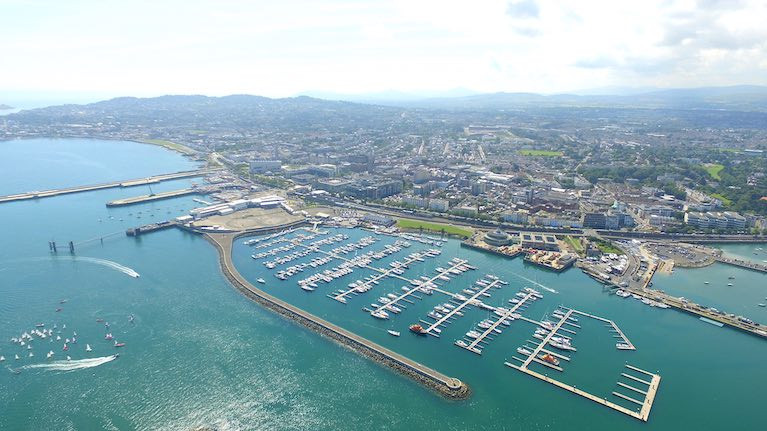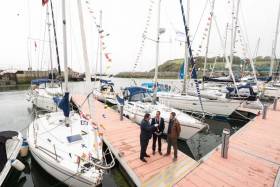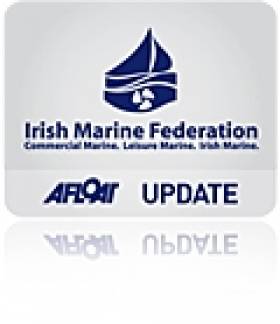Displaying items by tag: marine leisure
Where is the Government's Missing 'Marine Leisure Section'?
The "sleeping giant" of the marine sector is how the marine tourism and leisure sector has been described.
It may well be, despite how hard the Covid pandemic has hit it this year.
The last socio-economic study of "Ireland's Ocean Economy" put the sector's annual turnover in excess of €1 billion and its employment level at 16,000.
Those are pretty impressive figures.
Certainly a sector deserving of government attention, but after the 2007 General Election, responsibility for the marine was broken up over five departments. Today this attitude towards the maritime sector is still a hallmark of a political and civil service attitude which does not fully appreciate its importance to an island nation.
 Marine leisure is a big growth area in Ireland
Marine leisure is a big growth area in Ireland
This has come home to roost in the problems of not having enough ferry services direct between Ireland and the European mainland to overcome the problems of Brexit and also the disaster that could face the Irish fishing industry.
Both are indicative of a government administrative system which does not put sufficient importance on what the sea means to an island nation, in Ireland's case - at the western extremity of Europe.
This is amply recorded in the attitude of former Taoiseach Bertie Ahern, whose administration got rid of the dedicated Marine Department, when he recently justified the British attitude towards the fishing issues in the Brexit negotiations saying the UK had an argument on which the EU should compromise. That contrasted with the former Irish Ambassador to Canada, Ray Bassett, saying the fisheries issue showed how badly Ireland had been treated under the EU's fisheries policies, but that this was very uncomfortable for the Government.
 Marine leisure spans the whole coastline and can be found in every harbour round the country
Marine leisure spans the whole coastline and can be found in every harbour round the country
Now to the story of a missing section of the State's marine administrative system….
Since Bertie's abolition of the dedicated Marine Department, I've looked occasionally for what used to be known as the 'marine leisure section'….
The last official reference I could find in this regard was under then Department of Transport, Tourism and Sport which described in 2005 the "Marine Leisure Section with its strongest role in developing appropriate frameworks for implementing safety standards across the marine leisure sector…"
This Christmas - who'll give me a simple present - tell me where is the 'Marine Leisure Section'?
Since then – nothing specific to be found….. I could never get a direct answer as to what had happened to it. I was told it was in the Department of Sport, couldn't find it there … Then told to try 'leisure and recreation' …. No luck.
I gather that the Marine Industry Federation also tried to find the missing section and put out its own alert earlier this year when the General Election brought a plethora of policy promises about the marine sphere… But this missing section hasn't been found….
Maybe my research has missed out……. Maybe all those involved were reassigned, transferred elsewhere and the section was renamed to something else…… Bureaucracy tends to do that ..
This Christmas – who'll give me a simple present ---- tell me where is the 'Marine Leisure Section'?
With the challenges faced ahead in 2021, the marine leisure section would have plenty of work to do, with considerable potential socio-economic benefit.
Just look at what the State's own report said ---- worth in excess of €1 billion and with an employment level of 16,000.
Royal Cork Joins Port Companies To Promote Cork Marine Leisure At Southampton Boat Show
#Tourism - The Port of Cork, Bantry Bay Port Company and the Royal Cork Yacht Club are joining forces to promote marine leisure in Cork at the Southampton Boat Show.
The three organisations are in attendance at Stand J047 from today Friday 15 to Sunday 24 September tasked with promoting their marina facilities to potential visitors.
They will also be targeting the luxury cruisers and motor yacht market to entice further calls to Cork, Crosshaven and Bantry.
In 2009 the Port of Cork implemented the Leisure and Recreation Strategy for Cork Harbour, with the primary focus of the strategy on water-based leisure and recreational activities in and around the harbour.
Speaking about attending the boat show, Sara Mackeown, commercial marketing executive for the Port of Cork, said: “This is great opportunity to showcase Cork as an ideal destination for marine leisure users.
“Our marina facility in the heart of Cork City is unique and having just completed the new Bantry Harbour Marina there is a great connection now between Cork and West Cork. We are delighted to work closely with the Royal Cork Yacht Club, who have huge experience in the field.”
Cork Harbour offers significant potential for further development of the marine recreation sector as an important source of enjoyment and economic gain for the local residents and visitors, and it is anticipated that attending the Southampton Boat Show will help to promote the marine facilities directly to the desired market.
Gavin Deane, general manager of the Royal Cork Yacht Club said: “The Royal Cork Yacht Club are delighted to be collaborating with both the Port of Cork and Bantry Bay Port Company in promoting the region.
“This year we have seen a significant increase in the number of visiting boats to our marina, the majority of whom have travelled from the south coast of the UK.
“We feel that with this growth in visitors, now is the ideal time to showcase everything that Cork has to offer and Southampton Boat Show 2017 is the place to do it.”
Donegal Marine Stakeholders Encouraged Over Integration Plan
#NEWS UPDATE - A Donegal TD is encouraging the county's marine stakeholders to submit suggestions for the Government's upcoming Integrated Marine Plan, as previously reported on Afloat.ie.
The plan, which will be published in the summer, "will be a national agenda for developing our country’s marine potential, across tourism, shipping, leisure, fisheries and other sectors," said Joe McHugh TD.
The Dáil deputy noted "it is significant" that Taoiseach Enda Kenny and Minister for the Marine Simon Coveney are "dealing with this personally" as "previous Governments did not give this type of prioritisation to the industry".
He added: “I encourage Donegal marine stakeholders who see potential for national development in the fisheries industry, sea tourism, marine leisure, oil production, renewable energy production, deep sea fisheries and in various other areas to make submissions to the Integrated Marine Plan."
More information on the Integrated Marine Plan can be found at www.oceanwealth.ie.
Ireland's First Irish Sea Marine Leisure Conference Planned
The Irish Marine Federation in its role as lead partner in the Interreg Programme, irish-sea.org, is currently working on the following projects. Executive Steve Conlon gives the following update to afloat.ie:
Marine Leisure Conference:
A conference to assist marine leisure companies to survive the current downturn on both sides of the Irish Sea is currently being planned. A number of high level speakers will be engaged to give advice on how to survive the recession and to bring forward development ideas to assist growth once the economies on both sides of the Irish Sea recover. The exact details of the speakers and the content is still being developed so if you have any suggestions for speakers or subjects to be covered please contact Steve Conlon. We intend this to be a seminal event of major importance to the industry so to ensure the maximum value can be gained for our members your input into the content and the context will be invaluable.
Coastal Communities:
The establishment of a number of Coastal Communities around our coasts to boast the marine leisure industry and to ensure that maximum number of marine leisure companies can benefit from the Interreg Programme. Two new coastal Communities about to get underway, Tralee Bay and Waterford/East Cork.
National Maritime Spatial Plan:
The Coastal Communities will also ensure that marine leisure becomes fully integrated into the national Maritime Spatial Plan when it is developed through contributing to a coastal audit of all marine leisure activities. Through our partners in South Wales, The Pembrokeshire Coastal Forum will assist us to produce an Integrated Coast Zone Policy for marine Leisure. This will be delivered through a number of workshops around the coast.
Marine Festivals and Events:
We have published the Social Economic Study into the value of the Volvo Dun Laoghaire Regatta: Copies of the study are available from Steve Conlon. The study provides an insight into the spend per boat, the tourism aspects of the event and also the visitor spend. Dun Laoghaire Rathdown County Council is using some of the data collected for another project that they are conducting into the development of a new brand image for the Town of Dun Laoghaire. The total value of the regatta is put at €2.4 million.
Irish-sea.org is also conducting a similar study for the Town of Wicklow who held a Sailfest in conjunction with the Conway Round Ireland Race. This study is still being compiled and the results will be published later in the Autumn. The Interreg Programme worked with both Wicklow Sailing Club and the local Wicklow Chamber of Commerce on the event and the study. Approx 10,000 people visited the town during the 3 days of the festival.
The Fenit based Coastal Community held a successful Seabreeze Festival as part of the Round Ireland Powerboat race. The Interreg Programme assisted the Community with several aspects of the event.
Business Training:
Several marine leisure businesses have benefited from the business training that is available through the County Enterprise Boards. If you wish to be involved in this activity please contact Steve Conlon.
Marina Management Training:
Irish-sea.org has been working with the British Marine Federation/Yacht Harbours Association to bring a number of courses to Ireland. We had hoped to run an "Intermediate Marina Managers" course in Ireland this year but this has now been but back until the spring of next year. The BMF will run a full Certified Marina Managers Course in Ireland in the Autumn. If there are any members who have the pre-qualifications for this course please contact Steve Conlon as the programme would like to assist as many of those who do qualify to participate. The BMF have chosen Ireland as the location to run this international course in competition with a number of other locations. Ireland came out tops in every respect from the well run marina facilities that they visited, travel access and transfer, conference and hotel facilities. Ireland as a venue came out tops in almost every criterion tested so from a marine leisure tourism perspective the holding of this prestigious course in Ireland may help put us on the map.
Contact: [email protected]

































































